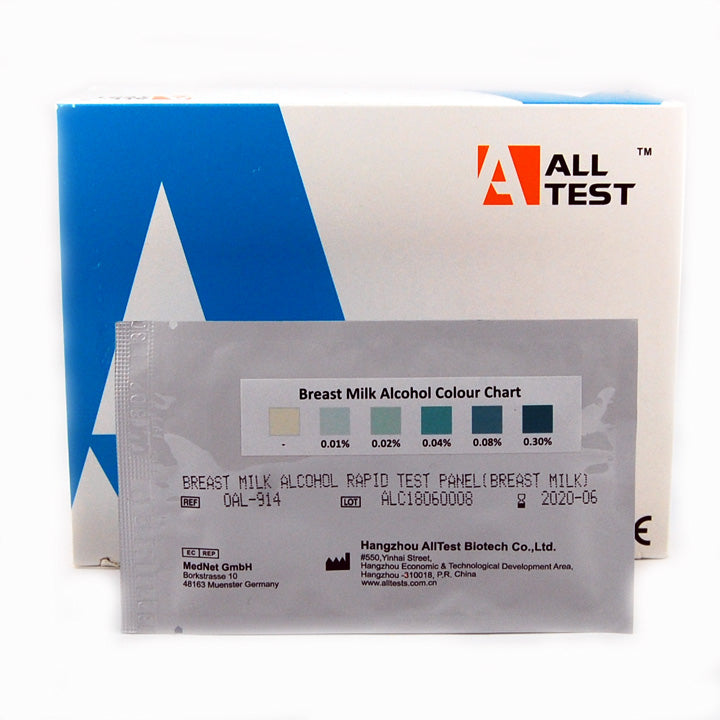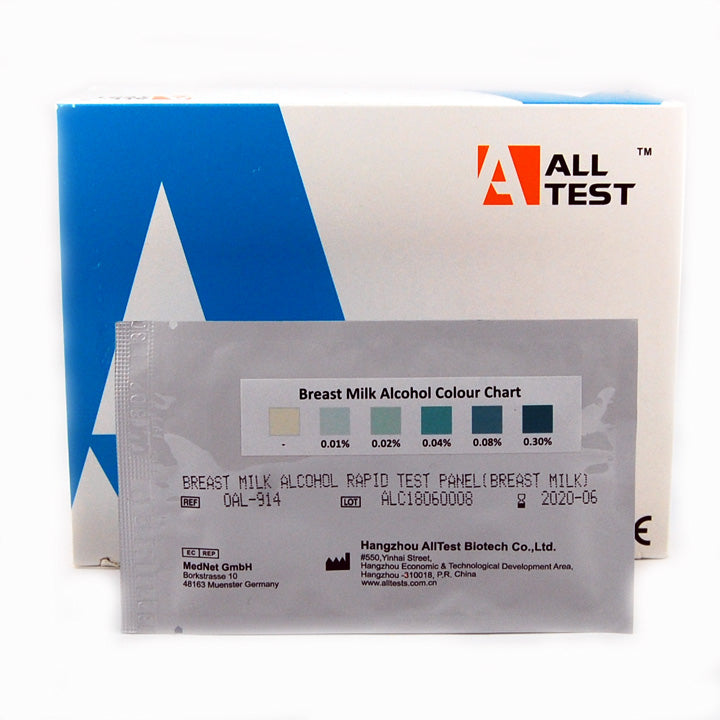valuebreathalysers.co.uk
ALLTEST Breast Milk Alcohol Level Testing Strips
ALLTEST Breast Milk Alcohol Level Testing Strips
Couldn't load pickup availability
Breast milk alcohol test strips
- The ALLTEST alcohol detection test strips for use in breast milk enables breastfeeding mothers to check to see if any significant amount of alcohol has passed into their milk after drinking alcohol, before they feed their baby.
- The manufacturer's full pack of 25 ALLTEST alcohol detection test strips for use in breast milk comes with data sheet instruction.
- Smaller packs will be packed with self-test instructions.
- Are an indicator of actual breast milk alcohol levels
- Results in 3-5 minutes.
- CE certified
- Accurate
- Easy to use
- Supplied with full instructions
- Quick and easy to read results
Breastfeeding and alcohol
Breastfeeding mothers are generally advised to be cautious about consuming alcohol. Alcohol can pass into breast milk and then to the baby, potentially affecting the baby's development and behavior. Therefore, it's generally recommended to limit alcohol intake or abstain completely from alcohol while breastfeeding.
Several factors can influence how much alcohol passes into breast milk:
- Time since consumption: The concentration of alcohol in breast milk peaks about 30-60 minutes after consumption, then decreases gradually as the body metabolises the alcohol. Waiting a few hours after drinking before breastfeeding can reduce the amount of alcohol in breast milk.
- Amount of alcohol consumed: The more alcohol a breastfeeding mother drinks, the higher the concentration of alcohol in her breast milk.
- Body weight and metabolism: Individual differences in body weight, metabolism, and liver function can affect how quickly alcohol is metabolized and eliminated from the body, which in turn affects the concentration of alcohol in breast milk.
- Hydration: Being well-hydrated can help the body metabolize alcohol more efficiently, potentially reducing the concentration of alcohol in breast milk.
- Food consumption: Eating food while drinking can slow down the absorption of alcohol into the bloodstream, which may result in lower concentrations of alcohol in breast milk.
- Frequency of breastfeeding: Breastfeeding more frequently, or pumping and discarding milk after drinking, can help reduce the concentration of alcohol in breast milk.
It's essential to remember that the effects of alcohol on breastfeeding babies can vary depending on factors like the mother's weight, metabolism, the amount of alcohol consumed, and the age of the baby. In general, it's a good idea for breastfeeding mothers to discuss any concerns about alcohol consumption with their midwife, GP or obstetrician to make informed decisions about their individual situation.
Please note the only way to ensure that there is no alcohol whatsoever entering into your breast milk is to not drink alcohol during the period while you are breastfeeding your baby. Once your baby is weaned off the breast then it will not be an issue.
Learn more here https://www.nhs.uk/conditions/baby/breastfeeding-and-bottle-feeding/breastfeeding-and-lifestyle/alcohol/
Share


